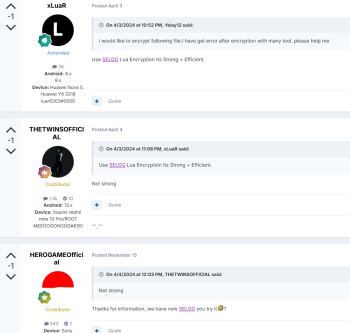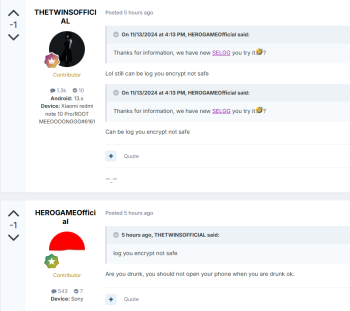-
Posts
484 -
Joined
-
Last visited
-
Days Won
15
Content Type
Profiles
Forums
Downloads
Gallery
Posts posted by kiynox
-
-
6 hours ago, APEXggV2 said:
copy and paste the copy I pasted from the copy of a paste to copy and paste from
This is more confusing, not gonna lie.
0 -
to encrypt
in Help
-
[ @hieuminh1504 ]
---
Could you please mention the games name?
---1 -
[ @Edi04 ]
---QuoteIs there something wrong with the way I write the contents of my script?
I'm not quite sure since I don't have the script myself, but there's part that pique my attention. So the breakdown:
You're getting only one result on "t" variable -> clearing result -> saving "t" to lists -> saving the lists into "tb" variable -> clearing the lists -> and change the "t" value into 0 (The "t" here only contains 1 from getResults(1))
---
So the possible problem is:- 1) You keep unnecessarily use addListItem() and getListItem() over and over, while you're already clearing the lists using clearList() (For example: line 59). Thus the "tb" lists only contain 1 from the result of "t" variable.
- 2) If you want to summon back all other codes, just use addListItem() again on where you're storing the lists as variable.
- 3) Is your wanted code exist on 't' variable? Because you're using the same name as variable. Naming them different will allow you to load the previous lists.
2 -
[ @Count_Nosferatu ]
---QuoteIt would be good to check first HTTP_USER_AGENT
Checking User-Agent is one thing but it wouldn't enough. You can instead capsulate the token inside the 'X' header, probably something like 'X-Token-Access'. But yeah, you need a good understanding of private-key and public-key. And yes, it's kind of doable in LUA GG even though it's primitive.
2 -
[ @Count_Nosferatu ]
---QuoteSo that it does not respond to requests from Firefox, Chrome, IE, Edge and other brouser
Even though each browser has it's own signature/fingerprint, but when it comes to postman or GG, you need to create one-time token to access the VPS/Server. For example you can create your own token generator on lua and make the server validates it.
1 -
[ @moh4mmed ]
---Quoteand now i want to make it public but with a key/login system but there is no source code or tutorial for that
Since you're mentioning "system", you're definitely need your own server/vps to create such authentication. There's a lot of tutorial for it already on Youtube on how to do it on server but on zygisk-imgui part, you need to do it yourself. The easiest approach is to include internet checking when the modules are being loaded, if you want using ui then I don't really know.
1 -
[ @moh4mmed ]
---
Find R1 from a couple of first instruction inside the method/function. Then you can use immediate float:example: mov r8, r1 change to: VMOV.F32 s0,#2.00000000 & VMOV R8, S0 --float 2
---
If you need more precision float, the instruction might be long, that's why you can allocate memory -> mimic the same instruction on allocated memory -> add the modified instruction -> jump into allocated memory from inside original method/function.
Read more about here: ARM Patching0 -
[ @carlapiyo ]
---Quotei change the sdk version and nothing change still crashing
Have you download the modded apk from this thread? Game Guardian: Android 14

---
0 -
[ @qeon ]
---gg.searchNumber("233;5;100::9", gg.TYPE_DWORD) gg.refineNumber('233', gg.TYPE_DWORD) results = gg.getResults() gg.editAll('45000', gg.TYPE_DWORD) gg.clearResults() while(true) if gg.getValues({{address=results[1].address, flags=results[1].flags}}).value == '233' then gg.getValues(results) gg.editAll('45000', gg.TYPE_DWORD) gg.clearResults() gg.sleep(5000) --in milisecond (5 second) end
It uses infinite loop to check the value every 5 second, if the value is '233' then it will change it again to '45000'. Adjust accordingly, this is just a concept.
---1 -
[ @Denver3D ]
---QuoteI can't seems to edit any offset field on ptrace game
If you can't rewrite any values from the memory, it is probably because your value is on Read-Only memory region. You can probably record some footage and attach it here for us to see.
---0 -
[ @DoDevil ]
---QuoteFind Offset by using Classname or Method on Non-Unity Games
You surely cant do that with classname or even method. It depends on how the game stored it's string. But the concept is like this:
Search for string -> pointer -> may lead to method
---
You need surely try with: IDA Pro. Or find anything that starts with: "PUSH" (Mostly PLT Function) or "ADD", it most likely the start of the function.
---1 -
[ @DaviMustang ]
---
The problem is on "input". There's no variable / function named "input". As you know:input[1]
Means you're getting the first result of an dictionary, where "input" must have been declared as dictionary variable:
input = {1,2,3,4,5} gg.alert(tostring(input[1]))
---
I've seen that you're using ";" which means it will be treated as grouped search. Probably you're looking something this:gg.searchNumber(1;2;2;2;2;123, gg.TYPE_DWORD)
---
So then what is "input"?0 -
[ @JessePin2345 ]
---
You can try to run the game on virtual machine, it offers more stable experience:
1) VPhoneGaGa
2) VMos Pro
---
Or you can try switch into more lightweight emulator:
1) MuMuPlayer
2) GTArcade
3) Wakuoo
And try to use these to rip your asset:
1) Ninja Ripper
2) SpecialK0 -
[ @AngelWolf ]
---Quote; - ;
because x64 allows backport of x32, bruh, it all depend on the emulator or the phone itself, usually emulator depends on the dekstop arch too iirc, maybe wrong idk, but to see if you're x64 or not, GG will appends [x64] beside the processSo... we're in the same term then.
---0 -
[ @AngelWolf ]
---QuoteWhat's yall yappin about, if the game runs in x86 lib then the phone architecture only support x86 or 32bit, same applied to x64, you cant force it
Bruh, the point from all of that is: The user didn't know wether the emulator is x32/x64 -> then try to force with x64 lib -> if fail, then it is x32. And you're partially correct, but some x64 do support x32. That's why you can either force it to x64 or x32.
---0 -
[ @HaKunAMataTa ]
---
You can try some of the following:
1) Revoke the USB debugging on Developer option -> Disable USB debugging -> Restart the ADB:adb kill-server adb start-server
-> Enable USB debugging again
2) If you're using Magisk Rootkit: On Magisk -> Superuser -> ADB -> Allow -> Magisk Setting -> Root Permission -> Apps & ADB
---0 -
[ @Mohamedbk649 ]
---QuoteI have tried it, but again run on x86, i don't understand !
Refer to my previous answer, you can force the game to run in 64-bit architecture by deleting all 32-bit libraries from the game's lib.
---0 -
[ @Mohamedbk649 ]
---Quotebut as far as i know the game is for both archs.
Even if the game support for multiple architectures, it will only use one. You can go visit the game directory: /data/data/game_package_name/lib. If there's multiple folder, delete it and just leave one (arm64, armv8-a, x64)
QuoteGoogle play services library can influence with that ? (run games on arch64).
Yes, if you download the game directly from playstore, it will download the game depends on your device default architecture.
---0 -
[ @Mohamedbk649 ]
---Quote[x64] don't show up
It's simply means that the game runs on x86 (32-bit)
---QuoteThat's why i think i need to force the game to use x64 or something like that no ?
It depends, what variant of Phoenix OS that you use. As far as I know, Phoenix OS do support arm64 or x64, try redownload the game with arm64/x64 architecture on: apkcombo.
---0 -
[ @g1doz ]
---Quotethose is the unchanged value near to them and maybe one of them is the xor key
Probably there's more than one xor key, just try to change the xor key to 0.
---1 -
0
-
[ @hexgameplays ]
---
Just download the modded apk from the thread:
 0
0 -
[ @Olot ]
---Quoteif i forget to enable and restart phone?
To be honest, I don't really know since I haven't doing it myself. But probably it can cause bootloop or your device might brick.
---Quotehow temporary disable works?
As it's name, it is temporary, the phantom will be turned on sometimes later (Overrided)
---0









Game Guardian closes by itself
in Help
Posted
[ @Royzz ]
---
---